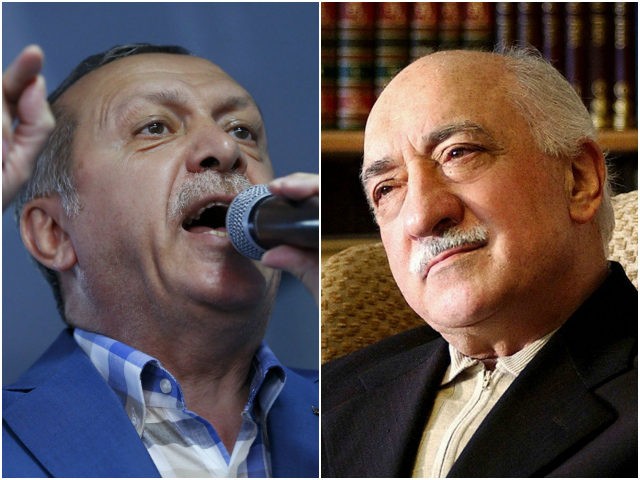CIA chief Mike Pompeo arrived in Ankara, Turkey, Thursday for his first trip abroad in the position, meeting with Turkish intelligence head Hakan Fidan, Prime Minister Binali Yildirim, and President Recep Tayyip Erdogan.
The Turkish officials reportedly stressed the need for the United States to abandon the Syrian Kurdish forces that have been among the most reliable allies Washington has found in the fight against the Islamic State and repeated their demand for the extradition of Islamic cleric Fethullah Gulen. Erdogan’s government blames Gulen for organizing the failed coup against him in June 2016, though Ankara has admitted to not sending Washington any evidence proving this.
Anadolu Agency, a Turkish state-run publication, reported this week that Pompeo arrived on Thursday and met with Yildirim on Friday after meeting Erdogan and Fidan on Thursday. Paramount among the topics of conversation with Yildirim, various media outlets report, were Gulen and the Syrian People’s Protection Units (YPG). While the Turkish government did not specify how these conversations played out, Turkish officials expressed optimism at the future of the bilateral relationship, suggesting the government was pleased with how Pompeo approached the subject.
In yet another sign of growing relations between Erdogan’s officials and the Trump administration, Yıldırım later spoke to Vice President Mike Pence on the phone, expressing his hope that Pompeo’s visit would herald in a “new day” in Turkish-U.S. relations.
President Donald Trump had spoken to his counterpart Erdogan on Wednesday, confirming Pompeo’s visit. That conversation, the White House told reporters in a statement, focused on the “close, long-standing relationship between the United States and Turkey and their shared commitment to combating terrorism in all its forms.” Anadolu reported that Erdogan, too, had pleaded with Trump for Gulen’s extradition and the severance of ties between the United States and the Syrian Kurds.
As if to put an exclamation point on Turkey’s demands, the government-friendly newspaper Sabah published an editorial on Friday, essentially reiterating Ankara’s demands as reportedly expressed to Pompeo. “The U.S. will have to ditch the Syrian Kurdish Democratic Union Party (PYD) and its terrorist force that has been dominating a section of northern Syria and which the Americans have used as a fighting ground force against Daesh,” the column read. “Besides this, aides to the two presidents will also work on a plan to eliminate the Gülenist Terror Group (FETÖ), which staged the failed bloody coup on July 15 in Turkey.”
Gulen, who lives in Pennsylvania, runs a network of charter schools in the United States that the FBI has investigated for potential fiscal mismanagement. American officials do not share the belief that the former Erdogan ally runs a terrorist organization, however, with officials likening Gulen’s “hizmet” movement to a cult more than a jihadi outlet.
The PYD, the political wing of the YPG, boasts closer ties to the United States. The militia has been among the most successful fighting the Islamic State and opposes the dictatorship of Bashar al-Assad. YPG ground troops often share intelligence with the United States to enable airstrikes on ISIS targets. They also seek to establish a sovereign Kurdistan, however, partially carved out of Turkey – a goal Ankara cannot allow them to achieve.
The Trump administration has inspired optimism among Syrian Kurds fighting the Islamic State. The White House has reportedly shared more weapons with the joint Arab-Kurdish Syrian Democratic Forces (SDF) now than during the Obama era. “Previously we didn’t get support in this form, we would get light weapons and ammunition,” SDF spokesman Talal Silo told reporters. “There are signs of full support from the new American leadership – more than before – for our forces.”
While such signs of support may irritate Ankara, they have a renewed need to strengthen ties with the United States: the decaying state of relations with Russia. While nominal allies against the Islamic State, relations with the Kremlin have come under tremendous strain in recent years, first with a Turkish attack on a trespassing Russian jet and, most recently, a Russian airstrike on Turkish troops in Syria. A gunman also assassinated Russia’s ambassador to Ankara, Andrei Karlov, in December, an act both sides vowed they would prevent from damaging their diplomatic ties.
Russia has issued a statement on the airstrike on Turkish soldiers this week, claiming it was an accident prompted by Turkey sending Moscow “mistaken coordinates” for a target, a claim Turkey has denied.

COMMENTS
Please let us know if you're having issues with commenting.